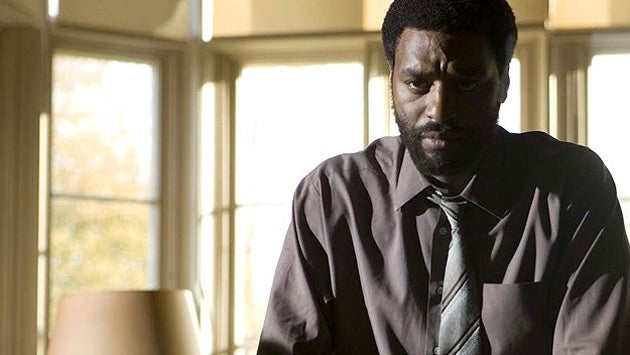Last Night's Television: Endgame, Channel 4<br>A Poet's Guide to Britain, BBC4<br>Compulsion, ITV1
The best of enemies

May bank holiday is made for drama. There is the perennial drama of the weather – will it piddle down all day, or won't it? And the perennial drama of the traffic – which motorway will have the longest tailback? And the annual denouement of the World Snooker Championship final, as ever unfolding late into the night on BBC2. So it was good to see Channel 4 and ITV1 upholding the bank-holiday tradition with dramas of their own, albeit that only one of them credited the audience with any intelligence.
This was the superb Endgame, which dramatised the secret negotiations in deepest Somerset in the late 1980s – courageously brokered by Michael Young, the public-affairs director of Consolidated Goldfields – between exiled leaders of the African National Congress and prominent Afrikaners, with a view to ending apartheid. Young was played by Jonny Lee Miller, whose intriguing CV includes the part of Sick Boy in Trainspotting and a three-year marriage to Angelina Jolie, yet here he radiated the quiet, uncharismatic decency of a man with a mousey wife at home in Surbiton, or possibly Gerrards Cross. It was, if Consolidated Goldfields will forgive me for invoking another kind of mining operation, a compact gem of a performance, out-glittered by others around it, but no less valuable.
Almost everything about Endgame was irreproachable. Paula Milne wrote a characteristically powerful script, to which a wonderful cast did full justice, while Pete Travis's taut, documentary-style direction fitted the piece perfectly, imbuing it with the moody suspense of a thriller. The complexities of the story and the need to represent so many people familiar to us, such as Nelson Mandela, P W Botha, Oliver Tambo and Thabo Mbeki, meant that neither Milne nor Travis had a straightforward task. Nor, for that matter, did the actors. But Clarke Peters perfectly conveyed Mandela's strength and dignity, and Timothy West, in what was sadly little more than a cameo, played P W Botha as a kind of Afrikaans version of Bradley Hardacre, his monstrous despot in the sitcom Brass of beloved memory.
However, it was Chiwetel Ejiofor as Mbeki, and William Hurt as the philosophy professor Will Esterhuyse, who glittered brightest. Invited by Young to represent white South Africa in the talks with the ANC, Esterhuyse felt morally compromised between his distaste for apartheid and his loathing for ANC-sponsored violence, and Hurt captured that ambivalence splendidly. Nobody does a more eloquent frown than Hurt, and here, as in his recent turn as the tortured Daniel Purcell in Damages, he had plenty to frown about.
He pretty much nailed the accent, too, with only a very occasional detour into cockney, reminding me of a friend of mine who recently walked into a travel agent in Holland Park, self-styled specialists in trips to South Africa, to ask how he could get to East London. "Just take the Central Line," said the young woman behind the desk, guilelessly. Hurt accidentally took the Central Line only a couple of times.
It was hard to spot the frailties in Endgame. I did wonder whether the phrase "collateral damage" would have been casually dropped as long ago as 1988, but if anachronism it was, it wasn't exactly a jet flying overhead during the chariot race in Ben-Hur. Less forgivably, there was a rogue apostrophe in the line at the end about it taking another four years before South Africa held "it's first democratic elections". But maybe that was only in the preview version I saw. And so what? On the whole, Endgame was a towering piece of television.
Not so Compulsion, a somewhat hamfisted attempt to update the Jacobean play The Changeling, featuring the genuinely hamfisted Ray Winstone as Flowers, long-serving chauffeur to a rich Indian family, who conspires to get lovely daughter Anjika (Parminder Nagra) out of an arranged marriage so that she can marry her boyfriend. The condition is that she sleeps with him.
That's a perfectly promising notion, and the cast did their best with Joshua St Johnston's script, but unfortunately, and through no particular fault of the two leads, there wasn't a scrap of credibility in the relationship between Flowers and Anjika, which developed into a full-blown affair. There were so many cracks in the plot, painted over in the clumsiest of brushstrokes, that the thing could more revealingly have been called "Emulsion". Those of you who remember Thunderbirds, imagine Lady Penelope being rogered by Parker, and you just about have the measure of it. Still, for the cultural references it unwittingly contained, I almost enjoyed Compulsion. By the end, my scribblings featured Thunderbirds, The Changeling, Lady Chatterley's Lover and The Graduate, and its not every TV drama that evokes all those great works.
Another great work, William Wordsworth's sonnet "Composed upon Westminster Bridge", was celebrated by the poet Owen Sheers in A Poet's Guide to Britain. "This City now doth like a garment wear/ The beauty of the morning; silent, bare," reckoned the Lakeland bard of Westminster Bridge. Just think how many more rhymes he could have got out of "London Eye".
Join our commenting forum
Join thought-provoking conversations, follow other Independent readers and see their replies
Comments
Bookmark popover
Removed from bookmarks